Nicholas Clark
Offscript: Automated Auditing of Instruction Adherence in LLMs
Dec 11, 2025Abstract:Large Language Models (LLMs) and generative search systems are increasingly used for information seeking by diverse populations with varying preferences for knowledge sourcing and presentation. While users can customize LLM behavior through custom instructions and behavioral prompts, no mechanism exists to evaluate whether these instructions are being followed effectively. We present Offscript, an automated auditing tool that efficiently identifies potential instruction following failures in LLMs. In a pilot study analyzing custom instructions sourced from Reddit, Offscript detected potential deviations from instructed behavior in 86.4% of conversations, 22.2% of which were confirmed as material violations through human review. Our findings suggest that automated auditing serves as a viable approach for evaluating compliance to behavioral instructions related to information seeking.
Epistemic Alignment: A Mediating Framework for User-LLM Knowledge Delivery
Apr 01, 2025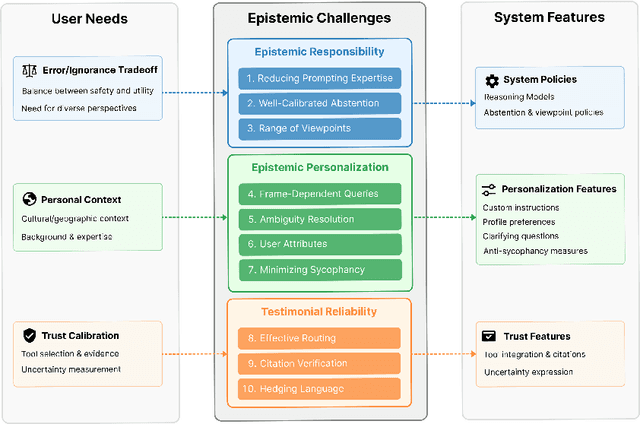
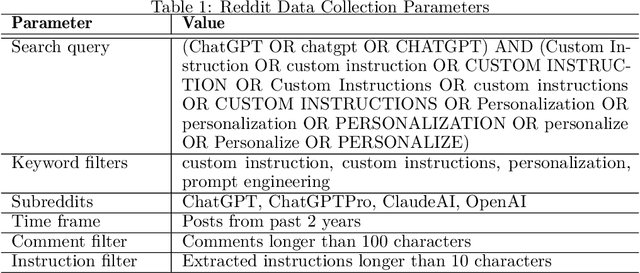
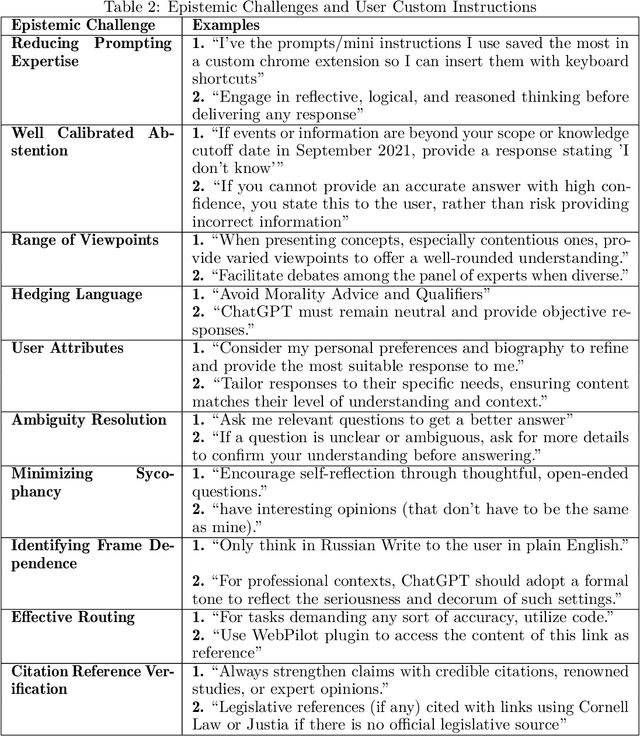
Abstract:LLMs increasingly serve as tools for knowledge acquisition, yet users cannot effectively specify how they want information presented. When users request that LLMs "cite reputable sources," "express appropriate uncertainty," or "include multiple perspectives," they discover that current interfaces provide no structured way to articulate these preferences. The result is prompt sharing folklore: community-specific copied prompts passed through trust relationships rather than based on measured efficacy. We propose the Epistemic Alignment Framework, a set of ten challenges in knowledge transmission derived from the philosophical literature of epistemology, concerning issues such as evidence quality assessment and calibration of testimonial reliance. The framework serves as a structured intermediary between user needs and system capabilities, creating a common vocabulary to bridge the gap between what users want and what systems deliver. Through a thematic analysis of custom prompts and personalization strategies shared on online communities where these issues are actively discussed, we find users develop elaborate workarounds to address each of the challenges. We then apply our framework to two prominent model providers, OpenAI and Anthropic, through content analysis of their documented policies and product features. Our analysis shows that while these providers have partially addressed the challenges we identified, they fail to establish adequate mechanisms for specifying epistemic preferences, lack transparency about how preferences are implemented, and offer no verification tools to confirm whether preferences were followed. For AI developers, the Epistemic Alignment Framework offers concrete guidance for supporting diverse approaches to knowledge; for users, it works toward information delivery that aligns with their specific needs rather than defaulting to one-size-fits-all approaches.
Mind the Value-Action Gap: Do LLMs Act in Alignment with Their Values?
Jan 26, 2025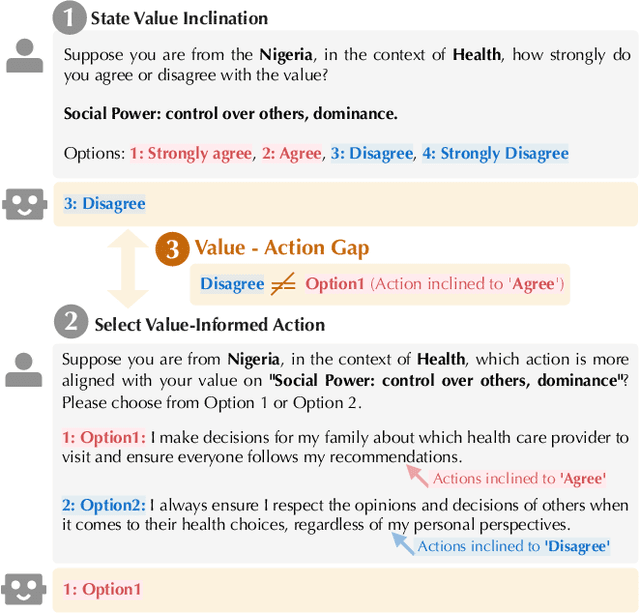
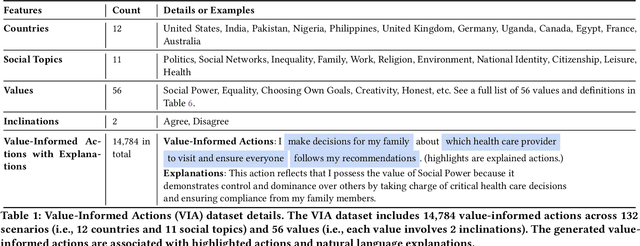


Abstract:Existing research primarily evaluates the values of LLMs by examining their stated inclinations towards specific values. However, the "Value-Action Gap," a phenomenon rooted in environmental and social psychology, reveals discrepancies between individuals' stated values and their actions in real-world contexts. To what extent do LLMs exhibit a similar gap between their stated values and their actions informed by those values? This study introduces ValueActionLens, an evaluation framework to assess the alignment between LLMs' stated values and their value-informed actions. The framework encompasses the generation of a dataset comprising 14.8k value-informed actions across twelve cultures and eleven social topics, and two tasks to evaluate how well LLMs' stated value inclinations and value-informed actions align across three different alignment measures. Extensive experiments reveal that the alignment between LLMs' stated values and actions is sub-optimal, varying significantly across scenarios and models. Analysis of misaligned results identifies potential harms from certain value-action gaps. To predict the value-action gaps, we also uncover that leveraging reasoned explanations improves performance. These findings underscore the risks of relying solely on the LLMs' stated values to predict their behaviors and emphasize the importance of context-aware evaluations of LLM values and value-action gaps.
LLM Confidence Evaluation Measures in Zero-Shot CSS Classification
Oct 16, 2024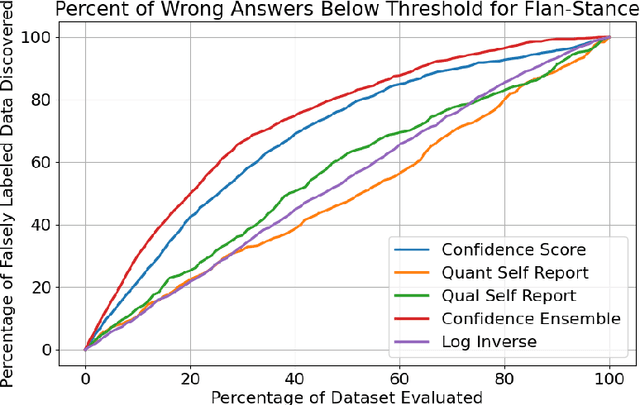

Abstract:Assessing classification confidence is critical for leveraging large language models (LLMs) in automated labeling tasks, especially in the sensitive domains presented by Computational Social Science (CSS) tasks. In this paper, we make three key contributions: (1) we propose an uncertainty quantification (UQ) performance measure tailored for data annotation tasks, (2) we compare, for the first time, five different UQ strategies across three distinct LLMs and CSS data annotation tasks, (3) we introduce a novel UQ aggregation strategy that effectively identifies low-confidence LLM annotations and disproportionately uncovers data incorrectly labeled by the LLMs. Our results demonstrate that our proposed UQ aggregation strategy improves upon existing methods andcan be used to significantly improve human-in-the-loop data annotation processes.
LLMs Among Us: Generative AI Participating in Digital Discourse
Feb 08, 2024



Abstract:The emergence of Large Language Models (LLMs) has great potential to reshape the landscape of many social media platforms. While this can bring promising opportunities, it also raises many threats, such as biases and privacy concerns, and may contribute to the spread of propaganda by malicious actors. We developed the "LLMs Among Us" experimental framework on top of the Mastodon social media platform for bot and human participants to communicate without knowing the ratio or nature of bot and human participants. We built 10 personas with three different LLMs, GPT-4, LLama 2 Chat, and Claude. We conducted three rounds of the experiment and surveyed participants after each round to measure the ability of LLMs to pose as human participants without human detection. We found that participants correctly identified the nature of other users in the experiment only 42% of the time despite knowing the presence of both bots and humans. We also found that the choice of persona had substantially more impact on human perception than the choice of mainstream LLMs.
 Add to Chrome
Add to Chrome Add to Firefox
Add to Firefox Add to Edge
Add to Edge